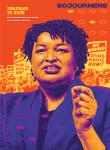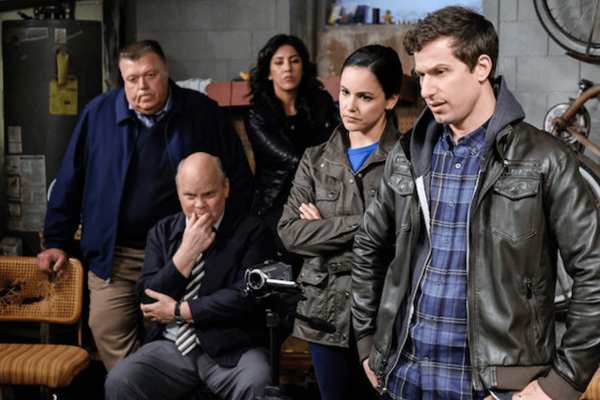IN THE FIRST season of Brooklyn Nine-Nine, the show’s main protagonist, Jake Peralta (Andy Samberg), arrests a jewel thief named Dustin Whitman (Kid Cudi) without sufficient evidence, and the entire precinct spends the next 48 hours trying to fix his mistake. By showing the police detectives desperately trying to find evidence, Brooklyn Nine-Nine portrays the arrest as a puzzle to be solved instead of an abuse of power.
With likable characters and sharp writing that hits more than it misses, Brooklyn Nine-Nine has cemented itself as both a critic and crowd favorite, earning Emmy nominations and massive support from its networks, NBC and Fox. Its cast is one of the more diverse on television, and so are its characters. The police captain is a gay, Black, married man. Two of the other detectives are Latinx; one of them is a bisexual woman.
But at the end of the day, the show sanitizes police brutality and misconduct with humor. Police incompetence in Brooklyn Nine-Nine is portrayed as funny and showing a need for the character to develop; it doesn’t threaten someone’s safety like it does every day in real life.
In an article for Vulture, Kathryn VanArendonk argues that TV loves the police and centers them over and over. Crime procedurals, even one as popular and seemingly positive as Brooklyn Nine-Nine, typically center the narrative of law enforcement and delineate the communities they “serve” as mere background for the actions of the main characters. Crime shows are propaganda for the police, telling the American psyche that we need cops to maintain order.
But the order that police defend is white supremacy. The history of police in the South goes back to slave patrols who caught and returned escaped slaves to their owners; in the North police were first formed to crush labor strikes. The cops are no friends to minorities, especially Black and brown communities. Brooklyn Nine-Nine opts to paper over the history of policing rooted in slave patrols with quips and cold opens, and it’s not funny.
I’m not Black but I have been threatened, followed, and harassed by law enforcement. I still feel their firm hands on my arms and back and the lasting paranoia of constantly feeling watched. If you’ve had similar experiences or experienced something much worse, you know that cops are no laughing matter.
I’m never going to watch Brooklyn Nine-Nine again. We have choices in our media consumption, and we should reject anything that portrays American policing as nonviolent or benign.

Got something to say about what you're reading? We value your feedback!







